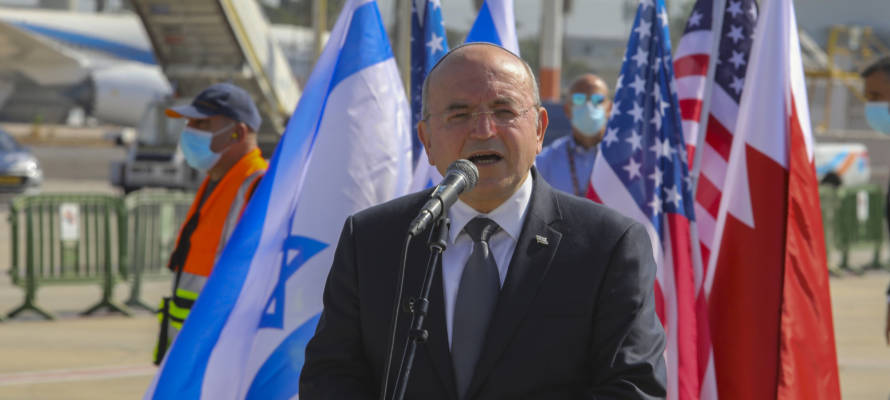Israel’s commercial El Al flight 973 — a nod to the international dialing code for Bahrain — flew through Saudi Arabia’s airspace en route to Manama.
By Associated Press and United with Israel Staff
A joint American-Israeli delegation landed in Bahrain on Sunday, where officials signed a number of bilateral agreements following an announcement last month to normalize relations.
During the meetings, Israel and the United Arab Emirates (UAE) agreed on 28 direct flights per week between the two countries.
The governments also approved 10 weekly cargo flights a week and unlimited charter flights to Eilat, an Israeli resort town in the country’s south.
U.S. Treasury Secretary Steven Mnuchin and Prime Minister Benjamin Netanyahu’s national security adviser, Meir Ben-Shabbat, led the delegation that flew out of Tel Aviv’s Ben Gurion airport.
Ahead of departure, Ben-Shabbat stated:
“I am excited and proud to head the Israeli delegation that is leaving today for talks in Bahrain. We are leaving for the talks in order to translate the peace declaration that was signed on the White House lawn by US President Donald Trump, Israeli Prime Minister Benjamin Netanyahu and Bahraini Foreign Minister Dr. Abdullatif bin Rashid Al Zayani, on behalf of King Hamad bin Isa Al Khalifa, into practical plans and concrete agreements.
“Today we will hold discussions in professional teams and working groups on a long series of issues: Finance and investments, trade and economy, tourism, aviation, communications, culture, science, technology, agriculture and others.
“We are excited and together we will pray that G-d might lead us to peace and that we might reach our destination for good life and peace.”
Israel’s commercial El Al flight 973 — a nod to the international dialing code for Bahrain — flew through Saudi Arabia’s airspace en route to Manama, where dignitaries from all three countries will speak at a ceremony after landing.
U.S., Israeli and Bahraini flags festooned the tarmac before take-off. Ben-Shabbat, one of the key Israeli officials involved in negotiations with Bahrain, said ahead of take-off that the visit will “translate plans to actions and concrete agreements” with the signing of a range of deals involving finance, investment, trade, tourism, communications, technology and agriculture.
Another Israeli official said the visit represents the official establishment of diplomatic relations between the two countries with the sides expected to sign a joint statement establishing full diplomatic relations.
The decision to establish ties with Israel has outraged the Palestinians, whose leadership has blasted the Bahraini move, and a similar Emirati deal, as a betrayal and an undermining of the Arab stance that recognition of Israel should come only after Palestinians achieve an independent state of their own.
As part of the deal to normalize relations, the two Gulf Arab states and Israel will eventually establish embassies and exchange ambassadors. The Israeli official said the Israeli embassy was expected to open in Bahrain in the coming months.
Similar to the United Arab Emirates, Bahrain is expected to open its embassy at some point in the city of Tel Aviv, where most foreign embassies are located.
Another Step Towards Normalization
Bahraini and Israeli officials have held numerous conversations since announcing their intention to establish full ties. Sunday’s face-to-face meetings, however, are seen as another step toward normalization.
Meanwhile, Israel and the UAE have already signed a number of business, banking and intergovernmental agreements.
Bahrain and the UAE signed the agreement to normalize relations with Israel in a ceremony at the White House on Sept. 15. Egypt and Jordan are the only other two Arab states to sign diplomatic treaties with Israel, in 1979 and 1994, respectively.
The accords made public what had been a gradual strengthening of quiet ties between Israel and several Gulf states — forged in recent years over a shared concern over regional rival Iran. Other Arab countries could follow suit, with analysts and insiders pointing to Sudan, Oman and Morocco as possibilities.
The trip to Bahrain on Sunday also came as U.N. arms embargoes on Iran expired despite American objections. Bahrain, like several other Gulf Arab nations, views Iran as the most-serious threat to its security in the Persian Gulf.
The Israeli delegation is slated to fly back to Tel Aviv later on Sunday, while the Americans will head to the UAE before flying to Israel on Tuesday.
Last month, the first known commercial flight between the two countries brought a delegation of Israeli officials to Manama to discuss cooperation between Israel and Bahrain following the signing of an agreement to normalize ties.
Netanyahu: ‘A Very Moving Day’
“The delegations will now work on cooperation agreements and establishing a peace agreement with Bahrain,” Prime Minister Benjamin Netanyahu said Sunday at the weekly cabinet meeting.
“This is an additional breakthrough in our relations with the Arab world thanks to the new and different policy that we are leading. It is not so new because we have been leading it for 25 years but it is bearing fruit today – peace for peace, economics for economics.
“This is a very moving day. I hope that we will be able to tell you soon about additional countries,” he said.
